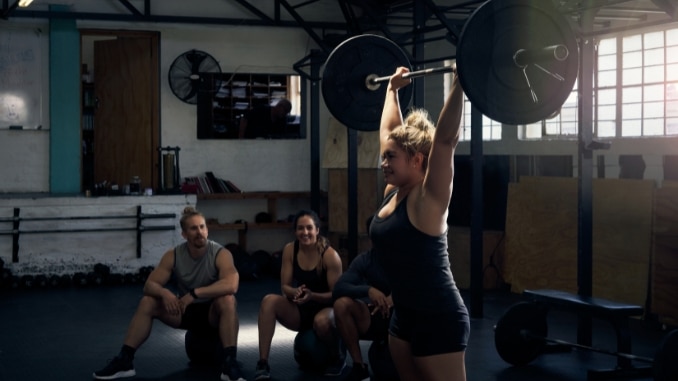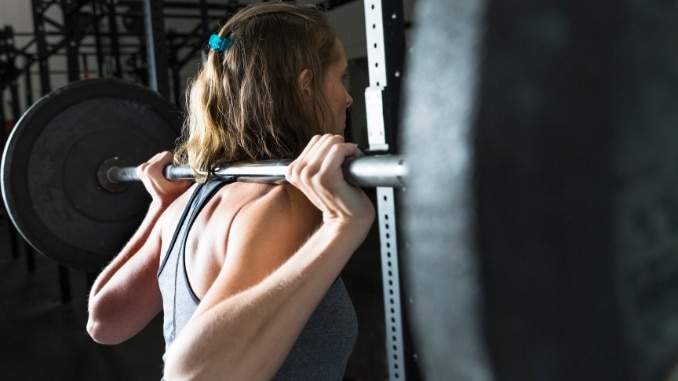Many women are looking into strength training these days, both for the health benefits and for the body-sculpting effects. Here’s why, and how you can best build up your muscles so that you feel more confident and healthier.
But there’s more to building muscle after 40 than just hitting the weights. Let’s bust myths, get strategic, and unlock what works—especially when hormonal changes [1], slower metabolism, and muscle loss are stacked against you.
1. Focus on Compound Movements

Hit the major muscle groups efficiently by prioritizing compound exercises like:
- Barbell squats
- Deadlifts
- Push-ups
- Lunges
- Dumbbell shoulder press
- Lat pull-downs
These exercises activate more muscle tissue, support muscle protein synthesis, and build total-body muscle strength faster than isolation movements.
2. Lift Heavier – Safely

Don’t fear the weights. Women don’t “bulk up” easily—especially when training 2–4x per week. To spark muscle growth:
- Gradually increase weight
- Use proper technique and form
- Focus on lower repetition ranges (6–10 reps)
Heavier loads trigger the release of growth hormone, helping burn more fat and sculpt lean muscle mass.
3. Eat Enough Protein (And Calories!)

You can’t support muscle growth or recover without enough fuel.
- Aim for 1.2 to 2.0 grams of protein per kg of body weight daily, based on activity levels.
- Examples: eggs, chicken breast, fish, beans, nutrient-dense foods, and healthy fats
Slashing calories while training hard? That’s a recipe for losing muscle, not fat.
4. Train With Intensity

Yes, you can tone with bodyweight moves—but go harder, not longer. Mix in:
- Resistance bands
- Free weights
- Bodyweight exercises (e.g., squats, push-ups)
This challenges the working muscles and stimulates protein synthesis more effectively.
5. Use High-Intensity Interval Training (HIIT)

Swap some cardio for HIIT to:
- Burn more body fat
- Preserve muscle mass
- Increase metabolism
- Improve body composition
HIIT = short, intense bursts + short recovery periods.
Bonus: it complements strength training by supporting muscle retention!
6. Rest and Recover Like It’s Your Job

Muscle recovery happens during rest, not while you’re working out.
- Schedule at least 1 rest day between strength sessions
- Sleep 7–9 hours a night to trigger muscle repair and hormone balance
Skipping rest? You’re risking injury and muscle loss.
7. Nail Your Protein Timing

Want better results? Hit your post-workout protein window.
Aim to eat 20–30 grams of protein within 60 minutes of training to maximize protein synthesis and enhance recovery.
8. Mix Upper and Lower Body Workouts

To create balanced body strength and avoid overuse:
- Alternate between upper body (back, shoulders, arms, chest)
- And lower body (glutes, hamstrings, quads)
Training all muscle groups evenly supports overall health and better bone density.
9. Prioritize Proper Form

Good form = long-term gains + fewer setbacks. Don’t chase bigger muscles at the cost of risking injury.
Use mirrors, record your lifts, or work with a coach. Focus on shoulder blade alignment, core stability, and joint control.
10. Set Realistic, Sustainable Goals

No, you don’t need to bench your body weight or spend 2 hours a day in the gym.
Start with 2–3 sessions per week. Track strength, not just scale weight. Celebrate climbing stairs without pain or carrying groceries with ease. That’s real progress.
“Women over 40 can absolutely build muscle—it just requires a smarter approach. You need to focus on progressive overload, prioritize protein, and allow for recovery. Strength training isn’t just about looks—it’s one of the most powerful tools for maintaining independence, balance, and quality of life as we age.” — Dr. Stacy Sims, Exercise Physiologist & Nutrition Scientist, Author of Roar
Why Women Over 40 Should Care About Muscle More Than Ever

Starting around age 30, muscle mass can begin to decline, with rates accelerating after age 50. That adds up fast.
This leads to:
- Bone loss
- More fat (especially abdominal fat!)
- Higher risk of chronic diseases [2]
- Lower energy levels
- Increased joint pain and injury risk
But here’s the good news: you can reverse that loss—and thrive—by focusing on building strength and lean muscle now. Strong muscles:
- Support a healthy metabolism
- Support fat loss
- Improve bone density
- Help you lose weight the right way—by losing body fat, not muscle
- Reduce the risk of diabetes, heart disease, and falls
And let’s not ignore the mental perks: studies show strength training improves mood, body image, and cognitive function, even outperforming yoga in some cases!
Final Thoughts: Yes, You Can Build Muscle at Any Age
Building muscle after 40 is not only possible—it’s essential. You’ll improve body composition, boost your energy levels, and build resilience for decades to come by exploring how female build muscle after 40.
With the right mix of resistance training, adequate rest, protein intake, and realistic goals, you’ll transform your body—and your life—without extreme diets or endless cardio.
Start small. Stay consistent. And remember, strong is not just sexy—it’s life-saving.
For your workout program to get strong without equipment, check out Bodyweight Blender now!
Frequently Asked Questions
Can female build muscle after 40?
Absolutely! Female can build muscle after 40. While it’s true that muscle mass naturally declines with age (a process called sarcopenia), women can still build and maintain lean muscle well into their 40s, 50s, and beyond. The key lies in consistent resistance training, eating enough protein, and allowing for adequate recovery between sessions.
What’s the best type of exercise for building muscle after 40?
Focus on compound movements that work multiple muscle groups at once—like bodyweight squats, dumbbell deadlifts, push-ups (on knees or incline), and dumbbell shoulder presses. These exercises build muscle strength efficiently and help with everyday movements like climbing stairs or lifting groceries. You can use free weights, resistance bands, or even body weight.
How often should I train to build muscle without risking injury?
For most women over 40 [3], 2 to 4 strength training sessions per week is ideal. This allows time for muscle tissue repair and prevents joint pain or overuse injuries. Combine this with adequate rest, good sleep hygiene, and proper form to stay strong and safe.


